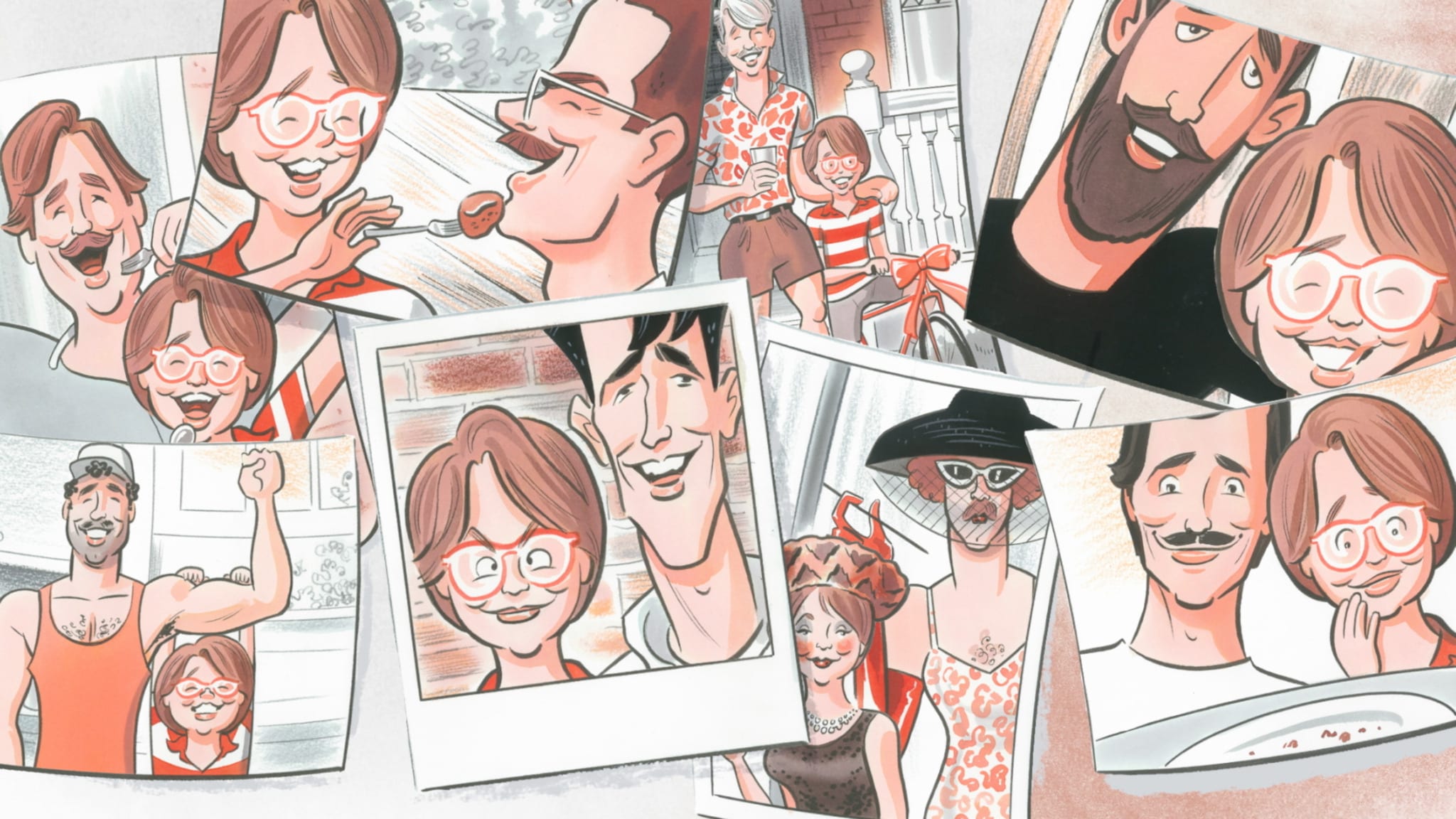A young boy is pictured surrounded by his father’s friends and lovers, his “aunties,” as they pose for a photo. Then the men begin to disappear, dissolving like spectres as they die, one by one, leaving the boy all alone. This striking image is part of a new two-and-a-half-minute animated film released on June 15 called My Aunties based on a 2010 interview that Stefan Lynch Strassfeld recorded for the storytelling podcast and nonprofit foundation StoryCorps.
As a child whose vast loving family was decimated in a matter of years, Lynch Strassfeld’s story offers a rare perspective on the AIDS crisis. Moreover, his father, Michael Lynch, was a gay liberation activist in the 1970s and ‘80s, a preeminent figure in Toronto who founded the city’s AIDS Memorial and taught the first gay studies course in Canada.
Lynch Strassfeld was 10 years old when his father’s friend Steve was diagnosed with AIDS: The first person they knew with the virus, he died within two months. As the short film goes on, Lynch Strassfeld tells us that his father passed away in 1991 and their huge family kept shrinking. “Everyone had died except for a handful of stragglers that I now hold near and dear to my heart—my aunties.” The video ends with him putting his arms around two men with grey hair, as they’re joined by the ghosts of their departed loved ones.
This story ventures into deeply personal territory, so it’s fitting that Lynch Strassfeld was interviewed by his friend Beth Teper rather than a stranger. The idea of fostering conversations between two people who already know each other is at the core of StoryCorps—establishing trust to delve deeper into stories.
StoryCorps started when the project’s first recording booth was set up in New York City’s Grand Central Terminal in 2003, inviting the public to step in and record accounts of all kinds. The location was fitting, with over 750,000 people passing through the 19th-century landmark every day, rushing home or to work with their stories in tow like shadows. StoryCorps was there to help those tales step into the light.
“Greater awareness of each other, of who we are and what we’re about leads to compassion, empathy and, we believe, a more just world.”
Now, this oral history mission takes on many forms: Users can record stories via an app, some of which run as segments during NPR’s daily show “Morning Edition,” or as a downloadable podcast. There’s even a video platform that lets people record interviews while they’re separated in isolation due to the COVID-19 pandemic. StoryCorps is also a repository of approximately 280,000 recordings archived at the Library of Congress in Washington, D.C. Forget celebrities—the focus is on real people, on sharing accounts of lives others may not otherwise come into contact with.
“Greater awareness of each other, of who we are and what we’re about leads to compassion, empathy and, we believe, a more just world,” says Lisa V. Gale, the chief program officer of StoryCorps.
StoryCorps began animating a small number of its accounts to stay in touch with a visually driven world and to reach out to younger audiences, the very people meant to keep these stories alive and carry them on into the future. In 2019, the podcast dedicated its entire season, called “Stonewall OutLoud,” to LGBTQ2 stories in commemoration of the 50th anniversary of the Stonewall riots. One of the animated accounts from that series, called A Life Worth Living, features a 12 year old named Genna interviewing her step-grandmother MJ, who tells the child she never thought she’d experience love or have a family before meeting the girl’s grandmother.
In The Devil and the Deep Blue Sea, Navy veteran Joseph Patton talks about being arrested for being gay and given an undesirable discharge. Now 81, he ends his story with the words, “I’m a lucky bitch, honey.” In The Door She Opened Dee Westenhauser discusses growing up in Texas in the 1950s, where her chic and stylish Aunt Yaya created a secret safe space for her female identity. In total, StoryCorps has collected over 2,000 accounts from LGBTQ2 folks.
Founder David Isay set out to collect these stories from the LGBTQ2 community to honour his father Dr. Richard Isay, a psychiatrist, psychoanalyst and gay rights activist who spent decades closeted. He was a pioneer in changing the way the field of psychoanalysis viewed homosexuality and he fought against it being labelled as a mental illness by the American Psychiatric Association (APA)—a battle won in 1973 when homosexuality was removed from the APA’s Diagnostic and Statistical Manual of Mental Disorders (DSM). Dr. Isay came out to his wife in 1980.
The platform serves many purposes: For some, it offers a respite in the middle of often-trying news reports on “Morning Edition,” while to others it’s seen as a living memorial. “I’ve recorded StoryCorps interviews with my family,” Gale says. “The hope is that my kids and their kids will be able to hear my voice and be able to pass that along.”
Sometimes, the stories that surface bear repeating as they find renewed relevance throughout the years, like the one shared by Lynch Strassfeld in 2010 that was dug out of the archives this year; the short film version was directed by Richard O’Connor. “So much of what we do is about reflection,” Gale says. “Stefan reflects on how AIDS was hitting him and his loved ones personally and how it helped shape who he is.”
The simple tale of love, community and loss has shifted and taken on many shapes over the years. A longer version of the story was published in the 2017 anthology Any Other Way, along with a poem by his father titled “Cry.” Michael Lynch wrote the poem two years before he himself died of AIDS at the age of 46, and it ends with the words, “Our memory […] will not endure these waves of dying friends without a cry.” As StoryCorps keeps reinterpreting that cry and preserving it for years to come, Lynch continues to be proven right.
Editor’s note: Xtra is deeply bound up with the story of My Aunties. The two grey-haired men depicted at the end of the film, for example, are Ed Jackson and Gerald Hannon, members of the editorial collective that ran Xtra’s predecessor The Body Politic; Hannon was also a longstanding board member of Pink Triangle Press which publishes Xtra. My Aunties was also designed by illustrator Maurice Vellekoop, who knew many of the aunties and is the boyfriend of Xtra’s executive editor Gordon Bowness.


 Why you can trust Xtra
Why you can trust Xtra


